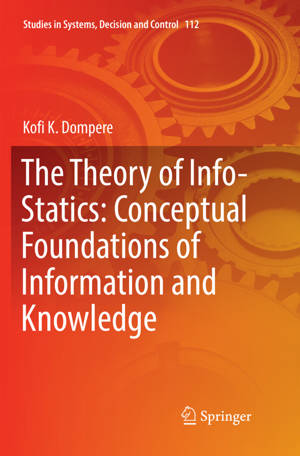
- Retrait gratuit dans votre magasin Club
- 7.000.000 titres dans notre catalogue
- Payer en toute sécurité
- Toujours un magasin près de chez vous
- Retrait gratuit dans votre magasin Club
- 7.000.0000 titres dans notre catalogue
- Payer en toute sécurité
- Toujours un magasin près de chez vous
The Theory of Info-Statics: Conceptual Foundations of Information and Knowledge
Kofi K Dompere
105,45 €
+ 210 points
Format
Description
This book discusses the development of a theory of info-statics as a sub-theory of the general theory of information. It describes the factors required to establish a definition of the concept of information that fixes the applicable boundaries of the phenomenon of information, its linguistic structure and scientific applications. The book establishes the definitional foundations of information and how the concepts of uncertainty, data, fact, evidence and evidential things are sequential derivatives of information as the primary category, which is a property of matter and energy. The sub-definitions are extended to include the concepts of possibility, probability, expectation, anticipation, surprise, discounting, forecasting, prediction and the nature of past-present-future information structures. It shows that the factors required to define the concept of information are those that allow differences and similarities to be established among universal objects over the ontological and epistemological spaces in terms of varieties and identities. These factors are characteristic and signal dispositions on the basis of which general definitional foundations are developed to construct the general information definition (GID). The book then demonstrates that this definition is applicable to all types of information over the ontological and epistemological spaces. It also defines the concepts of uncertainty, data, fact, evidence and knowledge based on the GID. Lastly, it uses set-theoretic analytics to enhance the definitional foundations, and shows the value of the theory of info-statics to establish varieties and categorial varieties at every point of time and thus initializes the construct of the theory of info-dynamics.
Spécifications
Parties prenantes
- Auteur(s) :
- Editeur:
Contenu
- Nombre de pages :
- 197
- Langue:
- Anglais
- Collection :
- Tome:
- n° 112
Caractéristiques
- EAN:
- 9783319871257
- Date de parution :
- 18-08-18
- Format:
- Livre broché
- Format numérique:
- Trade paperback (VS)
- Dimensions :
- 156 mm x 234 mm
- Poids :
- 317 g

Les avis
Nous publions uniquement les avis qui respectent les conditions requises. Consultez nos conditions pour les avis.






